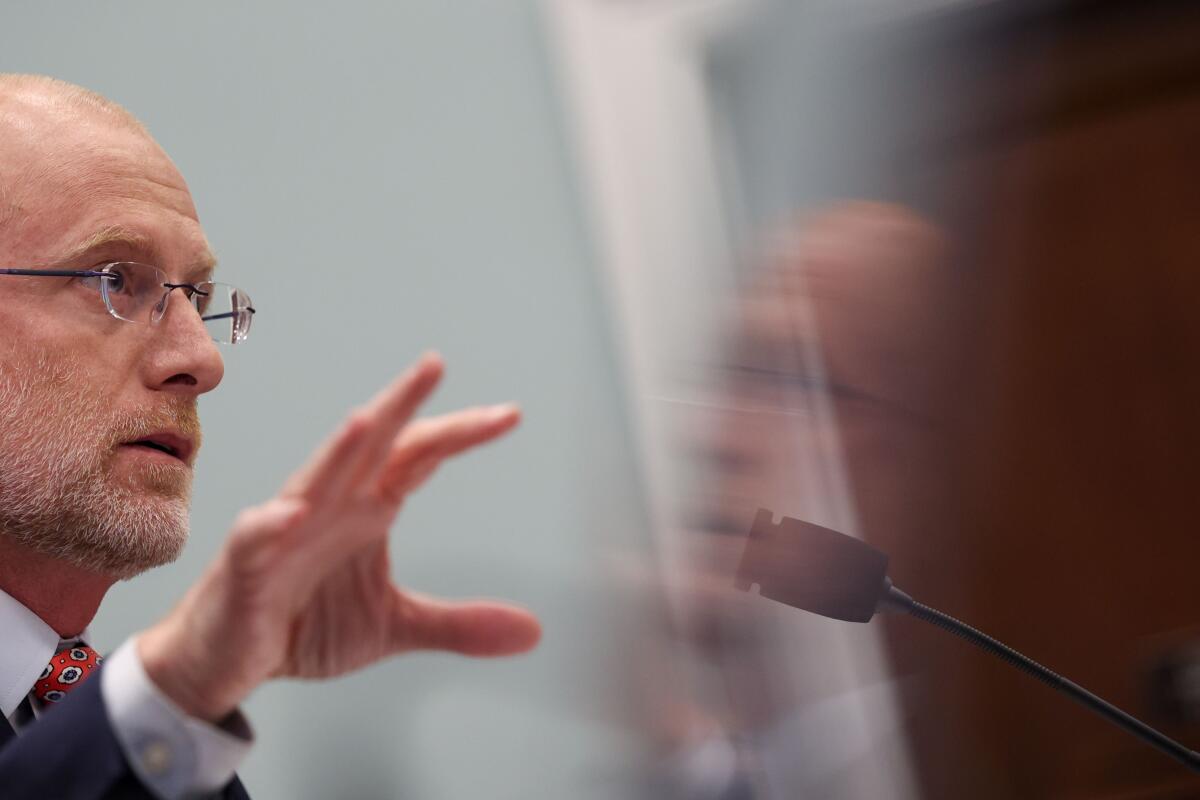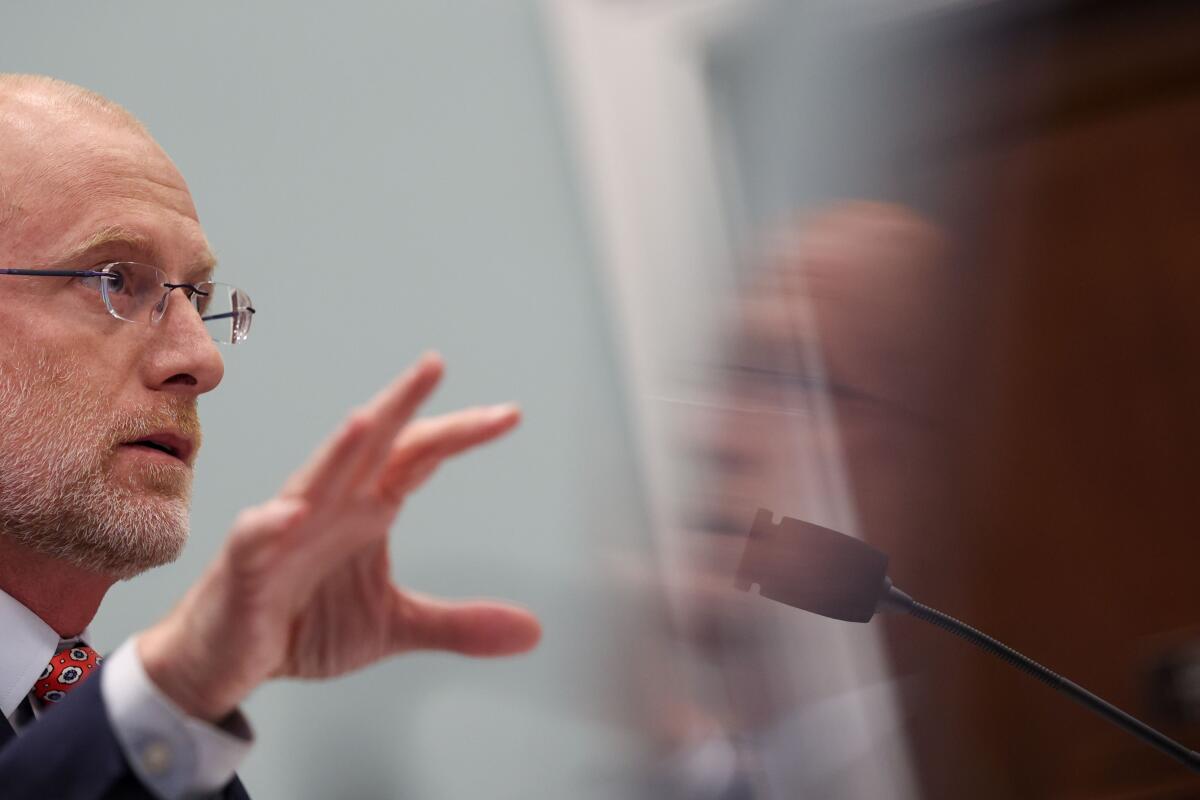DEI is dead at Paramount, David Ellison’s Skydance promises FCC
David Ellison’s Skydance Media pledged to abandon all diversity, equity and inclusion programs at Paramount Global in an attempt to win government approval for its $8-billion merger.
Paramount already had scaled back diversity programs earlier this year. In a Tuesday letter to Federal Communications Commission Chair Brendan Carr, Skydance said it would go further to cancel diversity efforts.
“Paramount no longer will maintain an Office of Global Inclusion and will not have any teams or individual roles focused on DEI,” Stephanie Kyoko McKinnon, Skydance general counsel, wrote in the three-page letter to Carr. The appointee of President Trump, in one of his first moves as chair, dismantled the agency’s diversity programs and called on companies to do the same.
Kyoko McKinnon said Paramount will remove “references to DEI in its public messaging, including on its websites and social media,” along with culling DEI language in “internal messaging and training materials.”
Last week, Ellison met with Carr to press his case that Skydance and its backer RedBird Capital Partners would be strong stewards of Paramount, which includes CBS, Comedy Central, MTV, BET and the Melrose Avenue movie studio, Paramount Pictures. Skydance needs Carr’s approval for the merger and the transfer of the CBS television station licenses to the Ellison family.
Skydance separately tackled persistent complaints by conservatives about alleged news bias at “60 Minutes” and other programs.
Ellison’s firm pledged to “promote transparency and increased accountability” at CBS News. The company said it would install an ombudsman, reporting to the president of Paramount, “to receive and evaluate any complaints of bias or other concerns involving CBS” for at least two years.
Trump’s ire over edits of a “60 Minutes” Kamala Harris interview last fall nearly derailed Skydance’s takeover of Paramount. Carr opened an inquiry into alleged news distortion after Trump sued CBS in federal court in Texas.
Earlier this month, Paramount reached a $16-million settlement with Trump to resolve the dispute that caused deep divisions within Paramount and prompted high-level CBS departures. Trump boasted Tuesday on Truth Social that he anticipates receiving an additional $20 million worth of advertising and PSA time from the new owners.
During his July 15 meeting with Carr, Ellison underscored “Skydance’s commitment to unbiased journalism and its embrace of diverse viewpoints, principles that will ensure CBS’s editorial decision-making reflects the varied ideological perspectives of American viewers,” according to an FCC filing.
Skydance’s Kyoko McKinnon added: “We further reaffirm that, after consummation of the proposed transaction, New Paramount’s new management will ensure that the company’s array of news and entertainment programming embodies a diversity of viewpoints across the political and ideological spectrum, consistent with the varying perspectives of the viewing audience.”
Ellison recently met with prominent journalist Bari Weiss, reportedly to discuss Skydance acquiring her center-right online publication, the Free Press, as an alternative to traditional news sites. She started the outlet, which is often critical of DEI, after quitting her job as a New York Times opinion writer, citing intolerance of her and her more conservative viewpoints.
Also last week, late-night host Stephen Colbert learned his CBS talk show would be canceled in May. CBS has said Colbert’s cancellation, which will take place in May, was “strictly financial” and not related to the merger approval. Still, conservatives and liberals have widely questioned whether Colbert’s frequent criticisms of Trump played into the decision.
Skydance has said it didn’t have a role in the Colbert decision.
Skydance isn’t the only company under pressure to ditch diversity programs to win FCC approval for a deal.
Two months ago, telecommunications giant Verizon pledged to drop diversity efforts to gain Carr’s blessing for the company’s $20-billion takeover of Frontier Communications.
Carr separately launched probes into Walt Disney Co. and Comcast Corp.’s workplace diversity efforts.
After George Floyd’s 2020 murder in Minneapolis, Paramount and other Hollywood companies vowed to hire more people of color. Such moves were cheered by many, including those cognizant of Hollywood’s troubled history with diversity.
Paramount encouraged executives to make diverse hires and promotions, and progress toward the corporate goals was one of many factors considered when calculating bonuses. That program was dismantled last year.
For years, CBS struggled to shake its prime-time sitcom formula to build shows around white men, a la “King of Queens,” “Everybody Loves Raymond” and “Two and a Half Men.”
The network broke the pattern in 2018 with “The Neighborhood,” starring Cedric the Entertainer, and procedural drama “FBI,” starring Zeeko Zaki.
CBS also championed mentorship programs for writers and directors to build a more diverse pipeline of creators. That initiative dated to 2004.

FCC Chairman Brendan Carr has made a priority of abolishing DEI programs.
(Bloomberg via Getty Images)
Skydance promised not to set numerical goals related to race, ethnicity or gender of job applicants.
“The company is committed to ensuring that its storytelling reflects the many audiences and communities it serves in a manner that complies with non-discrimination requirements and other applicable laws,” Kyoko McKinnon wrote.
“I am very encouraged by today’s announcements,” said Daniel Suhr, president of the conservative Center for American Rights, which filed an FCC complaint about “60 Minutes” and suggested a CBS News ombudsman. “These are important steps towards better broadcasting that serves all consumers.”

